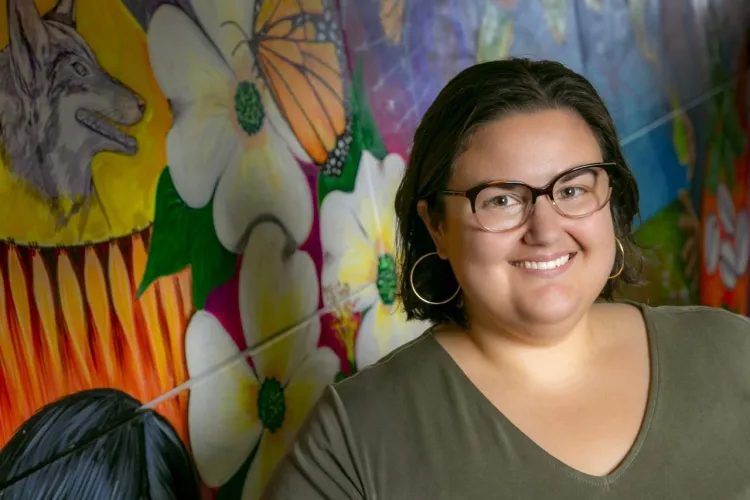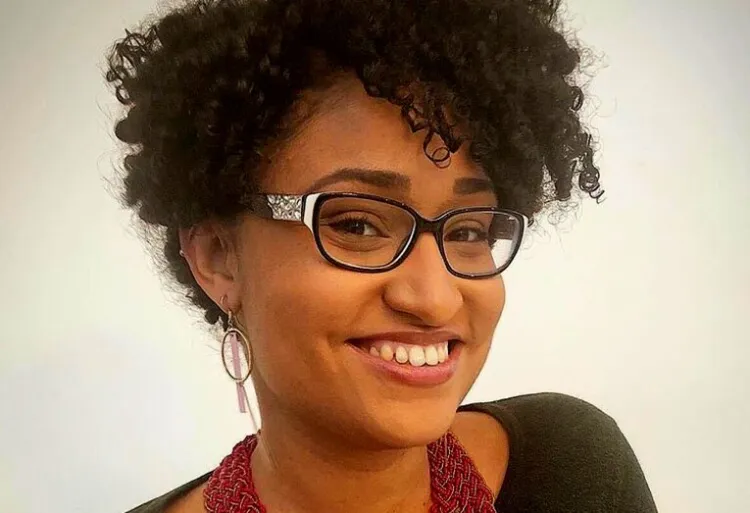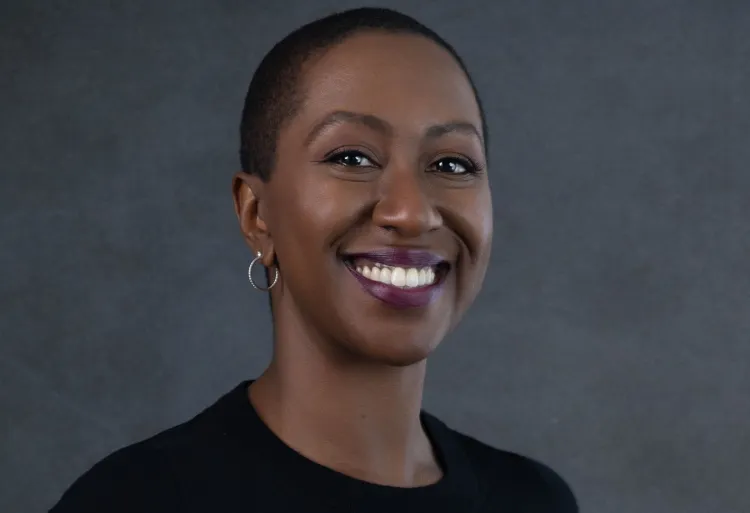Alumni & Student Highlights

Cecilia Marquez
Cecilia Márquez is an Assistant Professor in History and previously taught Latino/a Studies at New York University. She earned her MA and PhD in American History at the University of Virginia. She also holds a BA in Black Studies and Gender and Sexuality Studies from Swarthmore College.
Cecilia Márquez is an Assistant Professor in History and previously taught Latino/a Studies at New York University. She earned her MA and PhD in American History at the University of Virginia. She also holds a BA in Black Studies and Gender and Sexuality Studies from Swarthmore College.
Her first book project, “The Strange Career of Juan Crow: Latino/a Racial Formations and the U.S. South, 1940-2010,” examines the social and cultural history of Latinos in the post-World War II South. She traces the history of Latino/as during the demise of Jim Crow segregation and their transformation from an ethnic group to a racial one. Her work helps historicize contemporary Latino/a migration to the U.S. South and emphasizes the importance of region in shaping Latino/a identity. Her second book project is a history of Latino/as and far-right politics.

Ashia Troiano
At Swarthmore her academic concentration was on education studies, history, and black studies.
Ashia Troiano (she/her/hers) is an educator and organizer from Harlem, New York and the Head of Educational Coaching for At the Table. Previously, she served as the Tutor Manager for the Dorm Project at the New York Foundling, taught Social Studies to high schoolers and middle schoolers, and wrote curriculum for the Schomburg Center for Research in Black Culture.
Ashia is on the steering committee of the New York Collective of Radical Educators (NYCoRE), a grassroots organization that fights for social justice inside and outside the classroom. With NYCoRE, Ashia has co-facilitated three teacher study groups: “Criminalization of Our Youth,” “Storytelling to Heal Ourselves and Educate Our Youth,” and “This is what an antiracist school would look like.” She has also co-presented workshops at Facing Race, Free Minds Free People, and the NYCoRE conferences.
Ashia received a Bachelor's degree from Swarthmore College, with a major in Education and History and a minor in Black Studies, and a Master of Arts in Teaching from Brown University.

Randall Keith Benjamin
Randall Keith Benjamin, II '09 was a Congressional Black Caucus Foundation Emerging Leader Intern for Representative Kendrick Meek (FL-D17)
Keith Benjamin serves as the Director of the Department of Traffic and Transportation for the city of Charleston, South Carolina. In his position he oversees all transportation maintenance, planning and partnerships at the local, county and state level. He is also the city’s representative on the CARTA Transit Board, Charleston Aviation Authority and the Berkeley- Charleston-Dorchester Council of Governments’ Policy Committee. Previously he served in the Office of Policy Development, Strategic Planning and Performance as well as led the Office of Public Liaison at the US Department of Transportation.
Prior to his Federal service, Keith was Community Partnership Manager for the Voices for Healthy Kids Community Consortium with the Safe Routes to School National Partnership. In this role, he was responsible for the recruiting and developing of public and private partners that were dedicated to creating healthy accessible and safe communities across the nation. At the national, regional and local level, Keith provided technical assistance to policy campaigns in underserved communities, built coalitions, increased leadership capacity, engaged elected officials, created advocacy resources and led The Nation Active Transportation Diversity Task Force.
Keith has also previously represented the Transport Workers Union of America, AFL-CIO advocating on behalf of 200,000 members and retirees and also served on Capitol Hill with Senator Carl Levin, the Small Business and Entrepreneurship Committee, the Senate Committee on Homeland Security and Government Affairs, the Committee on House Administration, Representative Kendrick Meek, and the late Representative Donald Payne.
A 2018 Next City Vanguard Fellow, he has served as a member of the National League of Cities Advisory Panel on Health Disparities, the Better Bike Share Partnership Equity Panel, the National Working Group on Healthy Food access with the Food Trust and the National Urban League and the National Capital Region Transportation Planning Board, Citizens Advisory Committee. He has appeared and written for the American Journal of Health Promotion, Prevention Institute, Institute of Transportation Engineers, Centers for Disease Control and Prevention, The American Planning Association, The Washington Post, The Root, Streetsblog, Urban Cusp, Huffington Post, and Black Enterprise.
Keith Benjamin is a graduate and Deans awardee of Swarthmore College, and comes to Charleston with his wife Tiffany Nicole and son Kingsley Randall.

Justene Hill Edwards
Justene Hill Edwards is a scholar of African-American history, specializing in the history of slavery in the United States. She received her doctorate in History from Princeton University in 2015. She also holds an M.A. in African New World Studies from Florida International University and a B.A. in Spanish from Swarthmore College. Hill Edwards' first book, Unfree Markets: The Slaves' Economy and the Rise of Capitalism in South Carolina (forthcoming, April 2021 on Columbia University Press, in the Columbia Series in the History of U.S. Capitalism) is an innovative work that explores an overlooked aspect of the rise of American capitalism: slaves’ personal economic activities, or the slaves’ economy. The first book to center the slaves’ economy in the rapid growth of capitalist enterprise in the slaveholding American South, Unfree Markets reveals the detrimental influence of capitalist innovation on enslaved peoples’ economic pursuits in South Carolina, the most pro-slavery state in America on the eve of the Civil War. Using a variety of archival records, Unfree Markets argues that though enslaved people acquired a few material goods and a degree of purchasing power from their own economic activities, the slaves’ economy ultimately supported South Carolina’s slaveholder who profited from their investments in slavery. In the end, it shows that for South Carolina’s slaveholding elite, investments in capitalist enterprise equaled freedom. But for enslaved people, capitalism did not equal freedom. Instead, it meant a continuation of the violent and exploitative regime that shaped their lives. Unfree Markets shows that the vestiges of race-based economic inequality are not in the late-nineteenth or twentieth centuries, but in the period of legal slavery.
Hill Edwards was a Consortium Fellow at the McNeil Center for Early American Studies at the University of Pennsylvania and a Quin Morton Teaching Fellow in Princeton University’s Writing Center. Her dissertation, “’Felonious Transactions: The Legal Culture and Business Practices of Slave Economies in South Carolina, 1787-1860,” was a finalist for the C. Vann Woodward Prize from the South Historical Association, a finalist for the SHEAR Dissertation Prize from the Society for Historians on the Early American Republic, and a finalist for the Herman E. Krooss Dissertation Prize from the Business History Conference. Her scholarship has been supported by the Program in American Studies at Princeton University, the Center for African American Studies at Princeton University, the Program in International and Regional Studies at Princeton University, and the College of Arts and Sciences at the University of Virginia. She is a Trustee of the Midland School and serves on the Board of Trustees of the Business History Conference.



